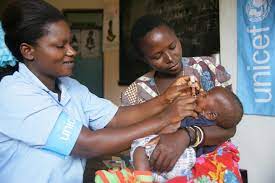The Plateau state coordinator of the World Health Organisation (WHO), Dr Musa Mahdi, says immunization is imperative in the prevention of vaccine-preventable diseases in children.
Mahdi said this on Tuesday in Jos during the commencement of the African Vaccination Week with the theme “Humanly Possible: Saving Lives Through Immunization.”
The coordinator said that through vaccination, diseases such as smallpox was eradicated globally.
He further said that vaccination reduced the burden of many vaccine-preventable diseases.
ALSO READ Immunization key to preventing childhood killer diseases – WHO
He urged parents and guardians to ensure that their infants and toddlers were fully immunised, to help build herd immunity and prevent diseases in children.
The Executive Secretary, Plateau State Primary Health Care Board, Dr Raymond Juylit, encouraged parents and caregivers to always avail their infants and toddlers of immunisation.
Juylit, who was represented by the board’s Director of Disease Control and Immunisation, Dr Yakubu Izang, said: “vaccination gives immunity against diseases and deaths that occur from such diseases.”
The health talks were given to mothers and a sensitisation walk was held to commemorate the week.
Immunization, or immunisation, is the process by which an individual’s immune system becomes fortified against an infectious agent (known as the immunogen).
When this system is exposed to molecules that are foreign to the body, called non-self, it will orchestrate an immune response, and it will also develop the ability to quickly respond to a subsequent encounter because of immunological memory. This is a function of the adaptive immune system. Therefore, by exposing a human, or an animal, to an immunogen in a controlled way, its body can learn to protect itself: this is called active immunization.
The most important elements of the immune system that are improved by immunization are the T cells, B cells, and the antibodies B cells produce. Memory B cells and memory T cells are responsible for a swift response to a second encounter with a foreign molecule. Passive immunization is the direct introduction of these elements into the body, instead of the production of these elements by the body itself.
NAN


